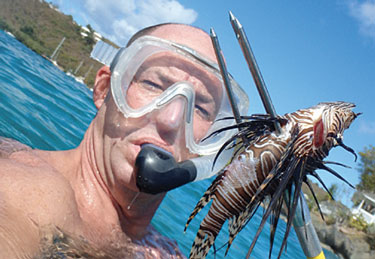WASHINGTON — Doug Domenech, U.S. Department of the Interior Assistant Secretary for Insular and International Affairs this week announced $1,488,890 in fiscal year 2018 grants to combat invasive species and protect natural resources in the U.S. territories of American Samoa, Guam, the Commonwealth of the Northern Mariana Islands, the U.S. Virgin Islands, as well as the freely associated states of the Federated States of Micronesia and the Republic of Palau.
“Invasive species in the islands are disruptive for both marine and terrestrial resources in the islands, which already face a delicate balance,” Domenech said. “Secretary Zinke and I are pleased to help control and eradicate invasive species in the islands in order to protect public health, livelihoods, and fragile environments and economies.”
Funding provided in this announcement is as follows:
- U.S. Virgin Islands Department of Planning and Natural Resources (DPNR) – $43,557 to develop a website and outreach plan to create awareness about invasive species and their impacts in the territory, and create a link between resource managers, educators, policy makers, and the general public on invasive species and potential eradication plans. In 2016, DPNR developed the first Invasive Species Action Plan for the territory.
- Commonwealth of the Northern Mariana Islands (CNMI) Department of Land and Natural Resources – $95,170 to fund an Invasive Species Coordinator. The coordinator’s primary task is to provide policy direction, coordinate among local and federal agencies, and plan for the control and eradication of harmful invasive species infestations such as the Coconut Rhinoceros Beetle (CRB), Oryctes rhinoceros, recently discovered in the CNMI. An additional amount of $123,454 will support continuation of the Coconut Rhinoceros Beetle Detection, Eradication, and Preventive program, initially funded by OIA in 2017 when the CRB was first discovered on Rota.
- Guam Department of Agriculture – $200,264 to eradicate and manage little fire ant infestation in the 502-acre Cotal Conservation Area in Santa Rita which borders residential areas and military land. Nearly 15 per cent of the area, or 70 acres has been infested.
- American Samoa Government – $459,274 to remove and dispatch feral cats and dogs as well as rats on the islands of Ofu and Olosega, which carry and transmit disease as well as disrupt and destroy endemic bird species. Funds will also be used to 1) clear seedbanks of the invasive Tamaligi tree, Falcataria moluccana, that were created after the disturbance in the forests caused by Cyclone Gita, 2) restore coastal forest areas with salt-resistant native tree species, and 3) restore the Nuu’uli Wetland, Stream, and Watershed. The American Samoa Government will conduct several of these activities in partnership with the National Park Service in American Samoa.
- Kosrae Association of Tourism Operators – $24,961 to address a recent outbreak of the Crown of Thorns Starfish (COTS), Acanthaster planci, on coral reefs in Kosrae, Federated States of Micronesia.
- Palau Conservation Society – $182,210 to remove and clear the invasive flowering vine, Merremia peltata, from terrestrial protected areas in Babeldaob and the Rock Islands Southern Lagoon UNESCO World Heritage Site. The PCS will partner closely with the Palau Bureau of Agriculture, local leaders, and communities in this effort.
- Yap Department of Resources and Development – $120,000 to assess, eradicate, and control a Little Fire Ant (LFA), Wasmannia auropunctata, infestation on the island of Yap in the Federated States of Micronesia. Plans include outreach efforts with local communities to prevent, manage, and control the spread of the LFA initially discovered on Yap in August 2017. The Governor of Yap has since issued an emergency declaration following the discovery of a third infestation site.
- Island Conservation – $240,000 for the removal of an infestation of harmful black rats and mangrove monitor lizards in Ulithi Atoll, Yap, Federated States of Micronesia. Rats and lizards are destroying important food gardens as well as nesting grounds for sea turtles and birds. Island Conservation will be working closely with the traditional leadership and communities of Ulithi to help protect these natural resources and people’s livelihood.
Funded are made available through the Office of Insular Affairs’s Coral Reef and Natural Resources initiative through which combating invasive species had been identified as a priority for 2018 applicants from the insular areas, according to the release. Applications are submitted from October through May 1st each year. Funds are awarded once OIA receives appropriations from the U.S. Congress until they are exhausted.
The assistant secretary and the Office of Insular Affairs carry out the secretary of the Interior’s responsibilities for the U.S. territories of Guam, American Samoa, the U.S. Virgin Islands, and the Commonwealth of the Northern Mariana Islands.
Additionally, OIA administers and oversees federal assistance under the Compacts of Free Association to the Federated States of Micronesia, the Republic of the Marshall Islands, and the Republic of Palau. OIA also supports the secretary’s mission of fulfilling trust and Insular responsibilities through balancing efforts and limited resources towards stronger economic and health capacities, and fiscal accountability in the U.S. insular areas, according to the release.

